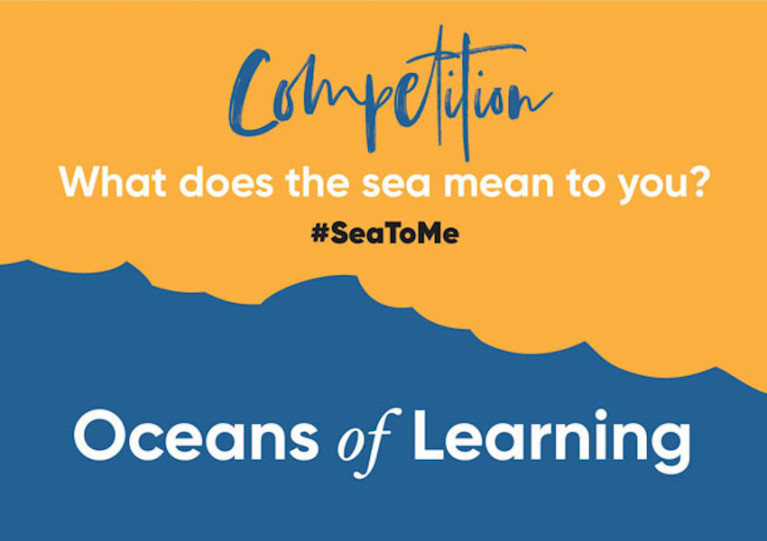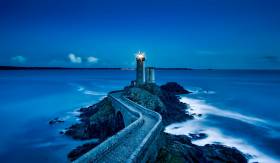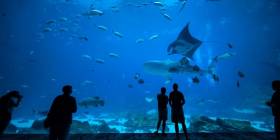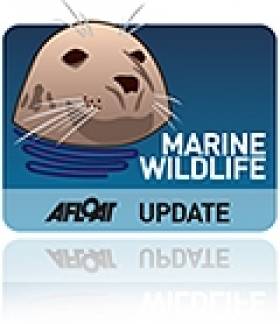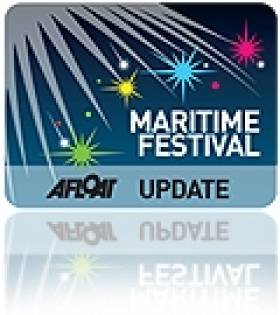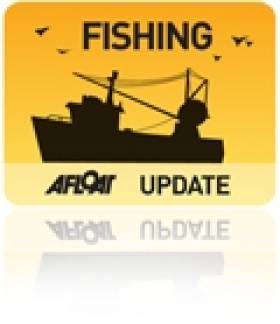Displaying items by tag: World Oceans Day
A “Clean Oceans” fishing gear retirement scheme has been announced by Minister for Marine Charlie McConalogue to mark World Oceans Day.
The project, which is aimed at collecting old and damaged fishing gear, is to take place this autumn and is being led by Bord Iascaigh Mhara (BIM).
The “Clean Oceans” initiative was established in 2019 to address the growing problem of plastics and other waste in the world’s oceans.
Almost 600 tonnes of waste has been hauled up in nets by fishers and by the wider Irish seafood industry during a series of pier and shore clean-ups, according to BIM. The initiative is supported by the European Maritime Fisheries and Aquaculture Fund.
“Protecting Ireland’s marine environment means protecting the marine habitat and protecting Ireland’s coastal communities today, and for future generations,” Mr McConalogue said.
“The livelihoods of those who live and work in these communities depend on their working environment being pristine. I am greatly encouraged by the huge efforts being made by fishers, and by the wider Irish seafood industry as part of the “Clean Oceans” initiative,”he said.
“This is an industry which is demonstrating the positive impact that is being made through working together to actively address the serious problem of plastics in our oceans,” he said.
The “Clean Oceans Initiative Fishing Gear Retirement Scheme”, as it is called, is being piloted in Ros-a-Mhíl, Co Galway later this year.
Fishers from the Ros-a-Mhíl fleet are being invited to dispose of their old and damaged gear as part of a free drop-off service at the pier. The fishing gear will then be recycled, upcycled, or disposed of responsibly, BIM says.
Vessel owners will be asked to register details of the materials they drop off to record their origin, and to allow BIM to track how they are used in the future.
BIM chief executive Jim O’Toole said that “genuine efforts are being made by the Irish seafood industry to do what it can to address the issue”.
He said collaboration across the industry and with the wider marine sector has been critical to the success of the “Clean Oceans” initiative.
Tune into a live chat with Ireland’s marine scientists to celebrate World Oceans Day next Wednesday 8 June.
The conversation will be broadcast live on the Marine Institute’s socials — Facebook, LinkedIn, Twitter and YouTube — at 10.30am.
Join Marine Institute scientists David O’Sullivan, Claire Moore, David Stokes and Caroline Cusack to hear what it’s like to survey our seas on Ireland’s national marine research vessels.
The RV Celtic Explorer and the RV Celtic Voyager are among the most intensively used research vessels in the world, and have played an essential role in fisheries surveys, seabed mapping, and oceanographic research.
Expeditions on the RV Celtic Explorer in Irish and international waters have resulted in many exciting discoveries — from deep-water shark nurseries and cold-water coral reefs to to hydrothermal vents fields in the mid-Atlantic.
The panel of scientists will share what they enjoy about their work at sea and some of their most memorable experiences while on board. They will also talk about their career paths and offer advice for those interested in pursuing marine and maritime careers.
This live broadcast is part of the Marine Institute’s Oceans of Learning series, which aims to remind everyone of the major role the ocean has on our everyday lives and to inspire a new generation of ocean champions.
More about the scientists taking part in the live chat:
David O’Sullivan, Advanced Mapping Services
David is part of the Advanced Mapping Services team at the Marine Institute and Ireland’s national seabed mapping programme, INFOMAR. David was offshore chief scientist for the SeaRover surveys (2017-2019) which mapped sensitive marine habitats at depths of up to 3,000 metres in Ireland’s offshore territory using the ROV Holland 1. The SeaRover team mapped cold-water coral reefs, documented new species within Irish waters and discovered a rare shark nursery 200 miles west of Ireland.
Claire Moore, Fisheries Scientist
Claire is a fisheries ecologist, and says she feels more like a detective then a biologist. She works on solving biological puzzles around the health and productivity of our oceans, piecing together valuable information collected at sea, in ports and labs, to produce statistical models that inform our decisions for a sustainable future.
David Stokes, Fisheries Scientist
David is an enthusiastic fisheries scientist with over 25 years’ experience in data collection and analysis, both in marine and freshwater. David has worked with the Marine Institute for the last 22 years to run the Irish Groundfish Survey programme on the RV Celtic Explorer, which originally started on the RV Celtic Voyager combined with chartered commercial fishing vessels.
Caroline Cusack, Biological Oceanographer
Caroline leads the Marine Institute’s annual ocean climate survey on the RV Celtic Explorer. She is also involved in ocean observation projects that monitor the health of our ocean. Recently she has carried out research related to developing marine ecosystem climate services.
An Taisce’s Clean Coasts and National Spring Clean initiatives have joined up to encourage people all over Ireland to take part in a nationwide beach clean to mark World Oceans Day on Wednesday 8 June.
And they’re offering coastal communities, schools, groups and individuals a free clean-up kit with bags, gloves and hi-viz vests — everything they need to host their own beach clean event.
In 2022, the focus will once more be on the 30x30 campaign: to create a healthy ocean with abundant wildlife and to stabilise the climate, it’s critical that 30% of our planet’s lands, waters and ocean are protected by 2030. RTÉ Learn has more HERE.
On World Oceans Day today, Monday 8 June, the Marine Institute is celebrating our connection to the sea and its importance to our lives with the launch of a social media competition offering ocean-inspired weekly prizes.
Marine Institute chief executive Dr Paul Connolly said: “With 1.9 million people in Ireland living close to the coast, the sea has an impact on all of our lives every day. Many people also rely on the sea for their livelihood, from fishing, tourism and transport to our seafood industry.
“To celebrate our connection to the sea, we are asking you to share what the sea means to you. Together, we can celebrate our seas and oceans and Ireland’s valuable marine resource.”
To enter the ‘Sea to Me’ competition, simply share ‘what the sea means to you’ on social media using the hashtag #SeaToMe.
Draw a picture, take a photo, upload a video, share a photo from a past holiday by the sea or favourite place along Ireland’s coast, or be inspired to write a poem or quote.
It may be a walk along the shore, a swim in the ocean or enjoying fish and chips by the sea. Every week, the Marine Institute and partners will be offering some great prizes inspired by our seas.
The ‘Sea to Me’ competition is part of the Marine Institute’s Oceans of Learning series, a collaboration with Ireland’s marine sector to celebrate our seas and our shared marine resource.
Over 10 weeks, the institute is sharing news and offering online interactives, videos and downloadable resources on a new marine topic each week – from the food provided by our seas, and our rich marine biodiversity, to our changing ocean climate, coastal communities and our ports and shipping.
The Marine Institute is working with Government departments and partners such as Bord Iascaigh Mhara, Bord Bia, National Maritime College Ireland, Commissioners of Irish Lights, Met Éireann, Marine and Renewable Energy Ireland (MaREI) and coastal communities and organisations across Ireland to enable everyone to engage with our ocean from anywhere.
Follow #SeaToMe and #OceansofLearning on the Marine Institute social channels on Facebook, Instagram and Twitter — the latter of which is hosting a marathon #WorldOceansDay chat today where Marine Institute experts will be sharing their expertise and raising awareness of our oceans heath, wealth and opportunities.
For more information on Oceans of Learning and the ‘Sea to Me’ competition, click HERE.
Famous buildings and landmarks across Ireland will ‘Go Atlantic Blue' over the weekend 7-10 June to celebrate our connection to the Atlantic Ocean as part of World Oceans Day.
The global day this Saturday 8 June connects people worldwide in celebrating the ocean, its importance in our lives and how each of us can protect it, no matter where we live.
In Ireland, more than 20 different landmarks are expected to participate in the day by lighting up their buildings.
Businesses, shops, schools and homes across the country will also ‘Go Atlantic Blue’ on the day also being celebrated by the likes of surfing scientist Easkey Britton, who spoke recently to Independent.ie about her own oceanic connections.
Everyone’s participation will highlight the strong connection that people in Ireland have with the Atlantic Ocean and the multiple ways that it affects and enriches our daily lives.
‘Go Atlantic Blue’ is being spearheaded in Ireland by the Marine Institute-led AORA-CSA (Atlantic Ocean Research Alliance Co-ordination & Support Action) against the backdrop of SeaFest 2019 and the Our Ocean Wealth Summit, both taking place in Cork in the coming days.
SeaFest is Ireland’s national maritime festival and Our Ocean Wealth Summit is Ireland’s flagship event for the marine sector, bringing together Irish and international organisations to create innovative and sustainable solutions to drive our Blue Economy.
This is the first year to ‘Go Atlantic Blue’ with the aim of raising awareness of the vital role that the Atlantic Ocean plays in the lives of Irish people, no matter how near or far they live from the Atlantic coastline.
Among the activities that AORA promotes through its work are the development of an ‘Atlantic community’, made up of citizens of countries that neighbour the Atlantic Ocean, and also exploring, observing and mapping the remainder of the Atlantic Ocean floor (which AORA calls “the last great exploration campaign on Earth”).
“Our ocean is our greatest natural resource and we see that most directly in Ireland with the vital importance that the Atlantic Ocean plays in our daily lives”
Marine Institute chief executive Dr Peter Heffernan said: “Our ocean is our greatest natural resource and we see that most directly in Ireland with the vital importance that the Atlantic Ocean plays in our daily lives — from influencing the weather to facilitating our trade industry and from seafood to surfing off the coast.
“The Marine Institute is proud to support the ‘Go Atlantic Blue’ initiative from 7-10 June, particularly at SeaFest and Our Ocean Wealth Summit, and we encourage and welcome everyone to come onboard.”
Dr Margaret Rae, director of AORA-CSA, said that the initiative gives people all around the country a chance to show their appreciation for the Atlantic Ocean.
“In Ireland, the Atlantic Ocean means so much to us. It’s our largest natural resource and we draw so much from it — our livelihoods, food, bounty, beauty, imagination, inspiration, song, poetry, health and wellbeing and much much more.
“Going Atlantic Blue is a way to draw attention to how each and every one of us experiences the Atlantic, what we love about our ocean and how we can be that generation that makes a difference.”
World Oceans Day At Galway Atlantaquaria This Sunday
#WorldOceansDay - Celebrate World Oceans Day at Galway Atlantaquaria in Salthill this Sunday 12 June from 11am until 5pm with a full program of interactive exhibits focused on fun, information, education and science.
Ireland's national aquarium joins hundreds of organisations all over the world in promoting the health of the sea, how we impact the oceans and how the oceans influence us.
The day's exhibits include ideas on how we can use the ocean's resources in a more responsible way, with the Smartbay team showcasing how marine technology is used to harness ocean energy.
The Marine Institute's Explorers Education Programme will also be promoting its 'Exploring Our Ocean' arts activities with opportunities to learn about what we love about the ocean.
David O'Sullivan, a marine biologist and hydrographer with INFOMAR, will give a talk on the programme's seabed mapping activities that underpin marine research, and will show some exciting seabed imagery of underwater mountains and shipwrecks beneath the waves.
Other activities on the day include interactive science and cartoon drawing workshops, arts and crafts, and face painting. There will also be special screenings of Octonauts and the Pelicans every hour for our younger marine enthusiasts.
World Oceans Day is a United Nations recognised day of celebration and action for the ocean, held every 8 June. The concept for a World Ocean Day was first proposed in 1992 by the Government of Canada at the Earth Summit in Rio de Janeiro, and was officially recognised by the UN in December 2008.
The Ocean Project has been the lead organisation promoting and co-ordinating this event since 2002, in partnership with many other organisations and networks, including the World Ocean Network and the Association of Zoos and Aquariums.
Find out more on Ireland's World Oceans Day events at the Galway Atlantaquaria website and Facebook page.
#MarineWildlife - Today is World Oceans Day, as Krank.ie reports, the day to recognise the wealth and diversity of the planet's seas.
And what better way to celebrate it than to highlight some of the extraordinary marine wildlife that make Ireland's coastline so inviting - starting with this amazing video (via The Daily Edge) of a basking shark in Cork Harbour, captured from overhead by a drone camera.
The enormous shark dwarfs the RIB piloted by our company Ocean Escapes, who shot this incredible footage.
Elsewhere in Cork, the Southern Star highlights this clip of a breaching minke whale off Galley Head.
And the Irish Whale and Dolphin Group has welcomed Ireland's newest solo dolphin, who may not be the friendliest of cetaceans!
Chet the bottlenose dolphin is visiting the South West from across the Celtic Sea, and is understood to be a "non-socialble solitary dolphin who does not seek out or engage with swimmers".
As such, the IWDG is urging any dolphin watchers in the region to be sensible and avoid a repeat of last summer's incidents with Dusty the Doolin dolphin.
Galway Expects Crowds For First Sea Festival
#Festivals - "Tens of thousands" of visitors are expected to flock to the City of the Tribes later this month for the first Galway Sea Festival over the June bank holiday weekend, according to the Galway Advertiser.
Dubbed the 'Mini-Volvo' by locals, the four-day event from 31 May till 3 June is hoped to recreate the celebratory atmosphere of last summer's successful Volvo Ocean Race finale, with a wide range of events both on and off the waters of Galway Bay.
Highlights include the festival regatta led by the Galway Bay Sailing Club's parades of sail on the Friday and Saturday evenings, and a traditional boat regatta by Badoiri na Cladaigh.
Watersports enthusiasts can get a taste of canoeing, diving, sea kayaking and windsurfing over the weekend, which also coincides with World Oceans Day - with family-friendly activities at the Galway Atlantaquaria on Sunday 2 June - and the International Canoe Polo Championships at Claddagh Basin.
Preceding the festival on Thursday 30 May will be the Bright Blue Sea Conference, a major international symposium on marine science, renewable energy, the environment and the 'blue economy'.
Last month it was reported that the Galway Sea Festival received the financial backing of Galway City Council, spurred by its aims to promote Galway as a maritime destination or commerce and tourism.
The Galway Advertiser has much more on the festival HERE.
Back to the Future for European Fish Week
World Oceans Day on 8 June will see the launch European Fish Week 2011 at Trinity College's Long Room Hub.
The evening will comprise an exhibition and brief talk on this year's theme of 'Back to the Future' - reclaiming the past richness of Ireland's seas and fishing communities.
"By reminding ourselves of how living with the sea used to be, we can better understand the present extent of overfishing and how we can play a part in ending it through an effective reform of the Common Fisheries Policy," according to organisers OCEAN2012.
The event, which will also feature music and a reception, begins at 6pm on 8 June at the Long Room Hub in Trinity College, Dublin 2. Those wishing to attend should RSVP to [email protected] by 3 June.
Further events will be taking place throughout Europe from 4-12 June. For more information visit ocean2012.eu.



























